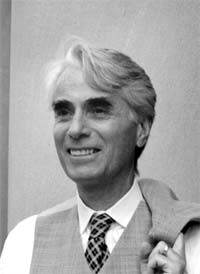 |
 |
 |
 |
|
OBITUARIES
A young philosopher’s first book is a runaway success and
thrusts him into the spotlight as a pioneer of American philosophy.
He follows that with years of teaching at Harvard, a University
Professorship there, more books, and myriad honors and
commendations. The success of Robert Nozick ’59 of
Cambridge, Mass., who passed away on January 23, was predicted
early on, according to classmate Bennett Miller ’59. “I
was a junior Phi Beta Kappa and was invited to select the rest of
the small percentage of the class that may join the group,”
Miller recalled. “At a meeting where we discussed classmates
who might be selected, a senior University administrator — I
can’t recall who — stated, ‘When you’re
dead and buried, Robert Nozick’s name will live on.’
” That part may certainly prove true, but did Nozick get in?
“Of course,” said Miller. Nozick was born in Brooklyn, N.Y., on November 16, 1938. He
attended public school, where he started out on the left by joining
the youth branch of Norman Thomas’s Socialist Party, and came
to philosophy through a copy of Plato’s Republic, which, as
he wrote in a later book, The Examined Life: Philosophical
Meditations (Touchstone Books, 1989), he read only some of and
understood less. “But I was excited by it and knew it was
something wonderful,” he wrote. At the College, Nozick
founded the local chapter of the Student League for Industrial
Democracy, which in 1962 changed its name to Students for a
Democratic Society. Nozick earned a master’s in 1961 and a
Ph.D. in 1963 from Princeton while serving as a philosophy
instructor. In his first book, Anarchy, State, and Utopia (Basic
Books, 1974), Nozick starkly and vigorously attacked the forms of
paternalistic government that “forbid capitalistic acts
between consenting adults.” The book was a critique of
Theory of Justice (Belknap Press, 1971), written by his
Harvard colleague John Rawls, who argued that it was right for the
bureaucratic welfare state to redistribute wealth in order to help
the poor and disadvantaged. Written in a chatty style that was praised for its
accessibility, Anarchy, State, and Utopia won a National
Book Award and was named by The Times Literary Supplement as
one of “The Hundred Most Influential Books Since the
War.” Nozick attacked the liberal orthodoxy that had created
and nourished the modern welfare state. The state, he wrote, is
fine, as long as it is minimal, as long as it does not coerce the
individual or usurp his rights — something he argued that
American government did on unexamined assumptions. He began by
defending the “night watchman” state of classical 19th
century theory, or the state in which government does no more than
protect its members from violence, theft and breach of contract.
The book transformed him from a young philosophy professor known
only within his profession to the reluctant theoretician of a
national political movement. Despite a reputation as a right-wing philosopher from
Anarchy, State, and Utopia, Nozick was intellectually
diverse in his writing and teaching. In Philosophical
Explanations (Belknap Press, 1981), he explored the nature of
knowledge, the self, free will and ethics. Nozick took on subjects
that many academic philosophers had dismissed as irrelevant or
meaningless, such as free will versus determinism and the nature of
subjective experience, and why there is something rather than
nothing. The Examined Life: Philosophical Meditations
(Touchstone Books, 1990), contained 27 essays on subjects such as
love, happiness and creativity, as well as evil and the Holocaust.
In 1995, he published The Nature of Rationality (Princeton
University Press) followed by Socratic Puzzles (Harvard
University Press) in 1997. His last book, Invariances: The
Structure of the Objective World, was published in October 2001
by Harvard University Press. Nozick’s first book seems to have staying power, though,
and his critique of America’s social welfare system continues
to define the debate between conservatives and liberals. Still in
print, Anarchy, State and Utopia has been translated into 11
languages and even stood as a prop in an episode of HBO’s
The Sopranos. In a caustic reference to the state’s
power to protect, a witness to a murder is shown reading the book
just as he learns from his wife that the mob boss Tony Soprano is
the suspect. Terrified, he decides not to testify. Nozick was chair of the Harvard philosophy department from
1981–84. He became Arthur Kingsley Porter Professor of
Philosophy in 1985 and in 1998 was named the Joseph Pellegrino
University Professor. Nozick received fellowships from the
Guggenheim Foundation, the Rockefeller Foundation, the National
Endowment for the Humanities and the Center for Advanced Study in
the Behavioral Sciences. He was a fellow of the American Academy of
Arts and Sciences, a member of the Council of Scholars of the
Library of Congress, a corresponding fellow of the British Academy
and a senior fellow of the Society of Fellows at Harvard. He served
as the president of the American Philosophical Association’s
Eastern Division from 1997–98, was a Christensen visiting
fellow at St. Catherine’s College, Oxford University, in
1997, and was a cultural adviser to the U.S. Delegation to the
UNESCO Conference on World Cultural Policy in 1982. The American
Psychological Association, presenting him with its 1998
Presidential Citation, called him “one of the most brilliant
and original living philosophers.” Nozick’s 1959 marriage to Barbara Fierer ended in divorce. He is survived by his second wife, Gjertrud Schnackenberg, and his children from his first marriage, Emily and David.
|
|
|||||||||||||||||||||||||||||||||||||||||||||||||||||||||||||||||||||
